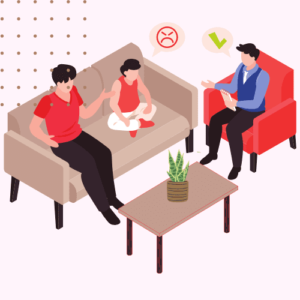
Love Addiction Test
Answer these simple questions to understand more about your Love Addiction. We share instant results and keep your information confidential.

What is Love Addiction Test?
The Love Addiction Test is a self-assessment tool designed to help individuals assess the presence and severity of love addiction tendencies or behaviors in their romantic relationships. It typically consists of a series of questions that inquire about one’s feelings, thoughts, and behaviors related to love and relationships. This test can provide insights into patterns of unhealthy attachment, dependency, or obsessive behavior in love, helping individuals recognize and address potential issues. It’s a valuable resource for those seeking self-awareness and potentially therapeutic intervention to cultivate healthier and more balanced relationships.
Who can benefit from this Love Addiction Test?
The Love Addiction Test is designed for individuals seeking insight into their emotional patterns and relationships. It can be beneficial for those who suspect they may have unhealthy attachment tendencies, experience recurring romantic turmoil, or struggle with codependency issues. People interested in self-improvement, personal growth, and forming healthier connections can find value in this test. Mental health professionals can also use it to assess and guide clients dealing with love addiction issues. Ultimately, it serves as a tool for anyone looking to better understand their relationship behaviors and work towards fostering more balanced and fulfilling love lives.


Love Addiction Test Accuracy
The accuracy of a Love Addiction Test can vary depending on factors like the test’s design, the honesty of the person taking it, and the comprehensiveness of the questions. While these tests can provide insights into one’s emotional tendencies and attachment patterns, they are not definitive diagnostic tools. Love addiction is a complex issue, and a test alone cannot replace professional evaluation by a therapist or counselor. Therefore, their accuracy should be viewed as a screening tool or a self-awareness exercise, rather than a conclusive assessment of a person’s psychological condition.
Types of Assessment to Measure Love Addiction Test
Clinical Interviews:
Mental health professionals may conduct clinical interviews to assess the presence and severity of love addiction. These interviews explore the individual’s relationship history, emotional experiences, and behaviors within romantic relationships.
Observational Methods:
Therapists or researchers may use observational methods to assess behaviors associated with love addiction, such as excessive texting, constant monitoring of a partner, or frequent relationship-related discussions.
Psychological Assessment Batteries:
Love addiction can be assessed as part of a broader psychological evaluation. It may be included in assessments for mood disorders, substance abuse, or personality disorders.
Neuroimaging and Psychophysiological Measures:
Some research incorporates neuroimaging (e.g., fMRI) and psychophysiological measures (e.g., heart rate variability) to understand the neural and physiological underpinnings of love addiction.
Behavioral Addiction Scales:
Given that love addiction shares similarities with other behavioral addictions, such as gambling or internet addiction, some researchers adapt existing addiction assessment scales to measure love addiction.
Online and Mobile Apps:
In the digital age, there are online quizzes and mobile apps available that claim to assess love addiction. However, their validity and reliability may vary, so caution is advised when using them.
Handling Love Addiction
Handling love addiction can be a challenging but necessary process for maintaining healthy relationships and emotional well-being. Here are some steps to address love addiction:
- Self-Awareness: Recognize that you may have a pattern of seeking excessive validation and dependency in romantic relationships.
- Seek Professional Help: Consult a therapist or counselor experienced in addiction and relationship issues. They can provide guidance and strategies for overcoming love addiction.
- Identify Triggers: Understand the emotional triggers that lead to love addiction, such as loneliness, low self-esteem, or past trauma.
- Build Self-Esteem: Work on improving self-worth and self-confidence independently of relationships. Engage in activities that make you feel fulfilled and self-sufficient.
- Healthy Boundaries: Set clear boundaries in your relationships to ensure that your needs and boundaries are respected.
- Support Network: Reach out to friends and family for support. Share your struggles with trusted individuals who can offer encouragement.
- Mindfulness and Self-Care: Practice mindfulness techniques to stay present and manage emotional responses. Prioritize self-care to maintain physical and emotional well-being.
- Avoid Triggering Situations: Be cautious about entering into new relationships immediately after ending one, as this can perpetuate the cycle of love addiction.
- Educate Yourself: Learn about healthy relationship dynamics and what constitutes a balanced, loving partnership.
- Patience: Recovery from love addiction takes time. Be patient with yourself and don’t be too hard on yourself if you experience setbacks.
Remember that overcoming love addiction is a journey, and seeking professional help is often essential. A therapist can provide personalized strategies and support to help you break free from destructive relationship patterns and build healthier, more fulfilling connections.